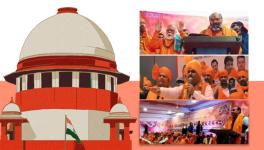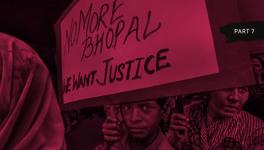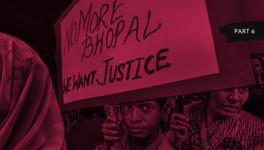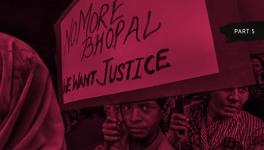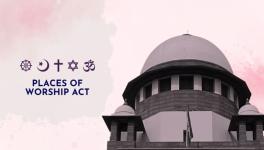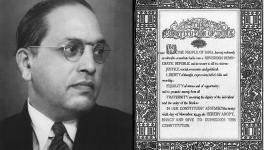EWS Quota is Against the Basic Structure of the Constitution, Counsel aver Before the Supreme Court
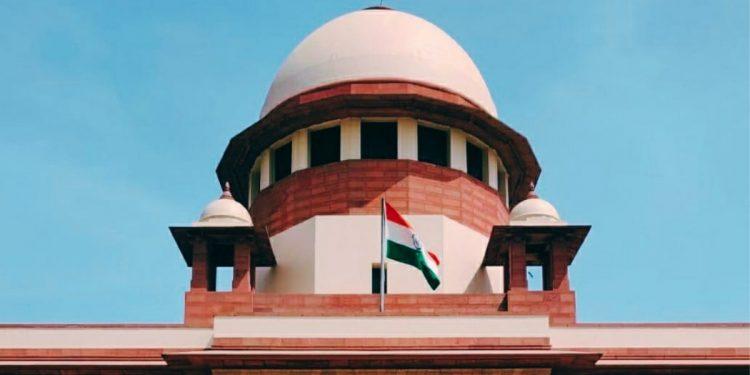
Petitioners’ counsel argued that the EWS quota enables the forward castes to infiltrate the category of weaker sections comprising the SCs, STs and the SEBCs, who were the intended beneficiaries of Article 46 of the Constitution.
—
The Supreme Court on Thursday continued to hear arguments against the validity of the Constitution (One Hundred and Third Amendment) Act, 2019 that provides for a ten per cent quota to economically weaker sections (‘EWS’) of citizens in admission to educational institutions, including private educational institutions. The petitions challenging the amendment are being heard by a five-judge Constitution Bench comprising the Chief Justice of India U.U. Lalit, and Justices Dinesh Maheshwari, S. Ravindra Bhat, Bela Trivedi and J.B. Pardiwala.
Senior advocate P. Wilson resumed his arguments against the validity of the amendment. Wilson submitted that the ‘weaker section’ in Article 46 is not the same as mentioned in Articles 15(6) and 16(6) of the Constitution. Wilson sought to rely upon the decision of a seven-judge bench in State Of Kerala & Anr vs N. M. Thomas, to submit that the 103rd amendment is an infiltration as Article 46 never thought of upper caste. Article 46 states “The State shall promote with special care the educational and economic interests of the weaker sections of the people, and, in particular, of the Scheduled Castes and the Scheduled Tribes, and shall protect them from social injustice and all forms of exploitation”.
Wilson contended that ‘weaker sections’ referred to in Article 46 are those mentioned in Articles 15(4) and 15(5), that is, socially and educationally backward classes (‘SEBCs’) and the Scheduled Castes(SCs) & Scheduled Tribes(STs). Wilson implied that the forward castes, who were not the intended beneficiaries of the quota under Articles 46 and 15(4) and 15(5) are now able to infiltrate the weaker sections category through Articles 15(6) and 16(6).
Justice Bhat pointed out to Wison that a Court can strike down the law if it violates fundamental rights.
“But here, the issue is whether a Constitutional Amendment that infringes fundamental rights can be struck down? You need to rise above the judgment that struck down the executive orders. What is the level of the violation which offends the basic structure is the issue”, Justice Bhat told Wilson.
Continuing with his arguments, Wilson submitted that Articles 14, 15 and 16 preach quality but the 103rd amendment by bringing monetary quality has altered the equality clause, which the Constitution never recognized and thought of. The exclusion of SEBCs and SCs/STs from the purview of the EWS quota, Wilson argued, violates the right to equality.
Senior advocate Dr. K.S. Chauhan argued that the classification to provide representation to unrepresented communities is a valid classification but the reservations to the EWSs which are already overrepresented in the public administration and educational institutions, seek to create a class which is an artificially created one as they cannot be said to be “outside the administration” and the members of such communities who are already represented in the administration, be it service, or education. Chauhan, thus, submitted that the 103rd amendment runs contrary to the prime constitutional objective and it is contrary to the basic structure principles.
Poor people or Economically Weaker Section (EWS) cannot be considered as a ‘Class’ for the purposes of giving representation in the form of reservation under the scheme of the Constitution of India, Chauhan argued.
Chauhan contended that there is no scientific or empirical data available which suggests the percentage of people who fall under the EWS Category or need any kind of assistance or Constitutional Protection. Nor there is any data to demonstrate that the member of the EWS are facing any deprivation or discrimination, owing to their economic status.
He added that the reservation is a tool for social empowerment and upliftment of the historically backward classes, this scheme can never be equated with a poverty alleviation program.
The new constitutional amendment denigrates its status as a poverty alleviation program, which is an insult to the very basic ideals of our constitution and the philosophy of the Constitution makers. Hence, the amendment is constitutionally invalid, as it is against the basic structure of the Constitution, Chauhan submitted.
Chauhan sought to submit that Parliament before enacting the 103rd amendment did not properly debate it. Justice Bhat was quick to point out that it was not the consideration before the bench as it could not have been since courts are barred to examine what takes place on the floor of the house.CJI Lalit also concurred with Justice Bhat.
Advocate Yadav Narendra Singh also argued against the 103rd amendment briefly.
Advocate Shadan Farasat sought to contend that reservations are anti-discrimination measures, not the anti-deprivation measures which the 103rd amendment seeks to achieve. He argued at length as to how the exclusion of the backward classes from EWS amounts to discrimination solely on the basis of caste, and negates the formal and substantive equality underpinning the equality code. He submitted that even if one were to assume that reservations could be an anti-deprivation measure, exclusion of the SEBCs violates the equality code because they are poorer than the forward class poor.
Farasat contended that the reservations for the backward classes are for a separate purpose. It is a quota for a group, not individuals, to correct historical wrongs, to ensure representation.
“This quota is a different animal. It speaks to the individual on the economic condition of that individual”, he added.
However, Justice Bhat sought to know from Farasat what was per se wrong if those covered under the EWSs do not belong to a homogenous group.
“We still see generations of poverty. We see BPL. There is a large mass of people falling into it. Why can’t there be economic-based affirmative action”?, Justice Bhat sought to know from Farasat.
Quoting from an article/research/report, Farasat submitted that “In 2005, the average annual household income of poor SCs was roughly 76% of the average income of poor Brahmins, and about 56% of the poor UCs. In 2012, it was 73% the income of poor Brahmins, and almost 73% of the income of the poor UCs. Thus, in both years, poor Dalits earn significantly less than poor Brahmins and poor UCs. Over the seven-year period, we see some convergence between Dalit incomes and Brahmin and UC incomes among the poor, but notice that the convergence between Brahmin and UC incomes is much sharper. In 2005, the absolute gap between poor Brahmin and poor Dalit incomes was roughly 31% of poor Dalit incomes. In 2012, the same gap was roughly 36% of poor Dalit incomes.”
Farasat submitted that he was not against the upper caste poor being beneficiaries but by their own perception, they do not see themselves as poor.
“Poverty is lined with caste status and your own self-perception”, he said.
Farasat also offered to the judges the alternative, that is, to read down the 103rd amendment by giving a purposive interpretation to it. He argued that the text of Articles 15(6), 16(6) insofar as it uses the phrase ‘any economically weaker sections of citizens other than the classes mentioned in clause (4)…’ in Articles 15(6) and 16(6) is open to two interpretations. First, it excludes persons belonging to all backward classes from the newly created EWS criteria, regardless of their economic status. This, Farasat said, would completely negate the equality code itself. He urged the court to read “other than” as “in addition” to the SEBCs.
Advocates Diya Kapur, M.P. Raju, Kaleeswaram Raj, Pratik R. Bombarde and Akash Kakade adopted the line of arguments of their predecessors.
Senior advocate Gopal Sankaranarayanan, appearing for an organization namely ‘Youth for Equality’ sought to submit that the organization is per se not against the EWS quota and that it is also against the caste-based quota. His grievance is that EWS quota breaches the ceiling of 50% quota. He submitted that the 103rd Constitutional amendment, to the extent it says “in addition to the existing reservation”, is unconstitutional because it violates the 50% ceiling limit which is now a constitutional norm and a basic feature.
Sankaranarayanan will continue with his arguments on Tuesday.
Get the latest reports & analysis with people's perspective on Protests, movements & deep analytical videos, discussions of the current affairs in your Telegram app. Subscribe to NewsClick's Telegram channel & get Real-Time updates on stories, as they get published on our website.











